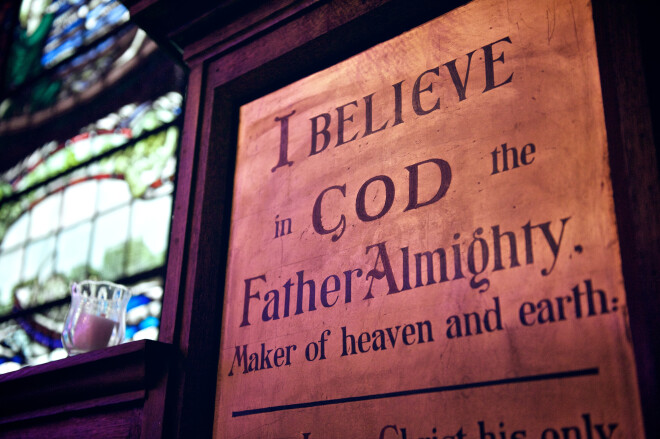The Apostles Creed

“No creed but the Bible, no creed but Christ.” Both phrases are slogans that you’ll find on church signs and behind pulpits. The sentiment driving each of these statements are noble, and yet they are naive at best. If we were to press a bit further, it would become apparent that most of us have particular beliefs about what the Bible teaches and who Jesus is. Many of us would not say, “you can believe whatever you want about what the bible’s message, as long as you are wholeheartedly committed.” Or, “Believe what you may about who Jesus is, so long as you are fully convinced.”
Mormons, Muslims, and Buddhists can all say they believe in Jesus, and yet we believe very different things about who He is and what He accomplished; those beliefs are profoundly and irreconcilably different. The Christian life is not an interpretive free for all; there are boundaries, and once these are crossed we are no longer operating within the stream of Christianity. That's is why the Church found it so helpful, throughout her history, to summarize in short statements what the Bible teaches about who Jesus is and why He entered into history. These ideas were codified in the early statements of Christian belief, some of which can be found in the New Testament itself (Acts 15:23-29, 1 Timothy 3:16).
Outside of the New Testament, perhaps the earliest and most complete creedal statement would be the Apostles Creed. It outlines, in a basic way, what Christians believe about who God is and what He’s done in Christ. There’s some indication that it started as a series of questions asked during a new believer's baptism. Only after the participant had answered, “Yes” to each of the 12 lines were they submerged. It’s this creed that we’ll be spending the next 12 weeks or so studying in our life groups.
This might feel a little bit counter-intuitive for those of us who grew up with evangelical backgrounds; aren’t the creeds just for people who accept tradition over what the Bible teaches? It's a good question, but it isn’t how the early church viewed the creeds. They labored and debated endlessly to make sure that creedal statements accurately reflected everything that the Bible said. So it’s important for us to recognize that the Apostles' Creed has authority, not just because it’s ancient, (although it is) but because it is an accurate summary of what the Bible teaches. Christians throughout the ages and from all branches of the church have recognized that this short statement accurately summarizes some of the most foundational teachings of the Bible.
Just because something is older doesn’t necessarily make it better or worthwhile…heresy after all, is as old as the New Testament, and we’re not clamoring to study heretical teachers. But there is something significant to the fact that the Apostles Creed is ancient, and reminds us that our faith is also ancient. The great temptation for those of us living in the modern world is what C.S Lewis called "chronological snobbery." We cut ourselves off from the wisdom of the past, thinking that we know better now. For Christians, this will not do. We are not the first generation to believe the Gospel, we’re not the first generation to follow Jesus, and we are certainly not the first generation to receive the Holy Spirit. As the West becomes increasingly hostile to Christianity, the way forward will likely be backward. Our task is to listen first to the Scriptures and then to the voices of those who have come before. We desperately need to hear from our ancient brothers and sisters who walked in the light of the Gospel in cultures far more hostile than our own. There is comfort in knowing we are not the first. We are indwelt with the same Spirit who led the Apostles, strengthened Ignatius in the lion's den, guided the early church in composing the Creed, laid hold of Augustine under the pear tree, illuminated the mind of Aquinas, and drew Luther to behold the Scriptures afresh. He has been faithful to guide the Church thus far, and He can be trusted to guide us safely to our home country no matter how dark the hour. So, this summer we're studying the Apostles Creed; a rich, ancient, and Biblical confession which has been shared by the global Church throughout the ages.

